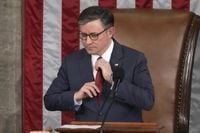At the heart of a tense standoff in Washington, a newly elected representative from Arizona finds herself at the center of a political storm. Two weeks after her decisive victory in a special election, Democrat-elect Adelita Grijalva remains in limbo, awaiting her official swearing-in to the U.S. House of Representatives—a ceremony that, under normal circumstances, would be a mere formality. But with the government shutdown dragging on and partisan tensions at a fever pitch, Grijalva’s entry into Congress has become a flashpoint, raising questions about precedent, political maneuvering, and the fate of high-profile legislation.
On September 30, 2025, Grijalva addressed reporters at the U.S. Capitol, poised to step into the seat once held by her late father. The mood should have been celebratory. Instead, it was fraught with uncertainty. As CNN reported, House Speaker Mike Johnson made it clear on October 7 that he would not schedule Grijalva’s swearing-in until Democratic leaders agreed to reopen the government. "We will swear in the elected Representative Adelita Grijalva as soon as the House returns to session, when Chuck Schumer, Mark Kelly and Ruben Gallego decide to reopen the government," Johnson declared, referencing the Senate Majority Leader and Arizona’s two Democratic senators.
Yet, Johnson’s stance stood in stark contrast to his previous actions. Earlier in April, during a similar period of legislative downtime, the Speaker had sworn in two Republican representatives—Jimmy Patronis and Randy Fine—during brief, minutes-long pro forma sessions. These sessions, which continue even during a government shutdown, are typically used to keep the legislative wheels turning just enough to satisfy constitutional requirements, but not for substantive business. As The Hill and Common Dreams both highlighted, Democrats have been quick to point out this inconsistency, arguing that Grijalva could—and should—be sworn in during one of these pro forma gatherings.
Grijalva herself has not been silent. In an interview published just days after her election, she spoke out against what she saw as needless foot-dragging. On social media, she was even more direct, writing, "There’s no reason why Speaker Johnson cannot swear me in tomorrow during the pro forma session," and later, "Swear me in NOW," tagging Johnson’s account for emphasis. The frustration among Democrats has only grown as the days tick by, with lawmakers even shouting at the presiding member during a recent pro forma session to swear in the Arizona Democrat—a plea that was quickly gaveled down.
So, what’s really behind the delay? Many in Grijalva’s party suspect it’s about more than just the shutdown. According to Common Dreams, Grijalva’s signature is needed to reach the critical threshold on a discharge petition—a procedural move that would force a vote on unsealing files related to the late Jeffrey Epstein, whose ties to powerful figures, including former President Donald Trump, have fueled years of speculation and conspiracy theories. Johnson, for his part, has repeatedly denied any connection. "It has nothing to do with that at all," he told CNN’s Manu Raju. "We will swear her in when everybody gets back. It’s a ceremonial duty." Yet, his shifting explanations—at one point saying the swearing-in would happen "as soon as she wants," and at another, tying it directly to the end of the shutdown—have only deepened suspicions.
The stakes are high, and not just for Grijalva or her constituents. With the House closely divided, her vote could tip the balance on critical issues, from budget negotiations to the fate of Medicaid and the Affordable Care Act. Democrats are fighting to reverse the Medicaid cuts included in the GOP’s July budget package and to extend expiring health care subsidies—measures they argue are essential to protecting millions of Americans’ health insurance. Republicans, meanwhile, insist on sticking to their spending plans, with Johnson using the swearing-in as leverage in the broader shutdown battle.
Senator Ed Markey of Massachusetts was among those who publicly criticized the Speaker’s approach. "Adelita Grijalva is the duly elected representative for Arizona’s 7th congressional district," Markey posted on social media. "Speaker Johnson: Stop delaying her swearing in. Stop hiding the Epstein files. And start doing your job." The rhetoric has only grown more heated, with some Democrats accusing Johnson and his allies of "stalling, delaying, and lying" to protect powerful interests and prevent transparency around the Epstein case. As one activist put it, "The public deserves answers—not excuses. Swear her in. Release the files."
For his part, Johnson has tried to deflect criticism by framing the delay as a matter of procedure, not politics. "No, this has absolutely nothing to do with this. We will swear her in when everyone returns. This is a solemn duty," he insisted, according to CNN. But analysts note that the events surrounding Grijalva’s oath and the ongoing shutdown require careful monitoring, as political differences between the factions can influence budget decisions and future steps regarding the government. They expect new statements and clarifications that could help break the deadlock, but for now, the impasse remains.
Meanwhile, Grijalva’s constituents in Arizona’s 7th district are left without full representation in Congress at a time of national crisis. "There’s no reason why I couldn’t have been sworn in, and it’s very problematic, because we’re facing a government shutdown. We’re going to have constituents who have questions, and there is nobody there to answer questions," Grijalva told The Hill. The sense of urgency is palpable—not just for her, but for the millions of Americans affected by the shutdown’s ripple effects on everything from paychecks to public services.
As the shutdown grinds on, the question of when—and under what circumstances—Adelita Grijalva will finally take her oath has become a symbol of larger battles playing out in Washington. Is it about procedural fairness, partisan gamesmanship, or efforts to keep explosive information under wraps? The answer, it seems, depends on whom you ask. What’s clear is that the stakes are personal, political, and, for many, deeply consequential. As both sides dig in, the nation watches and waits for the next move.
For now, Grijalva’s empty seat in the House stands as a reminder of the unfinished business in the Capitol—and of the enduring tug-of-war over power, transparency, and the meaning of representation in American democracy.




